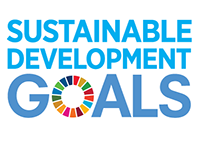Farmers’ Market Sales
Definition:
Total annual gross sales across all Comox Valley Farmers Market Association (CVFMA) markets
Limitations:
The total sales include only direct-to-customer purchases at CVFMA-operated markets held on Saturday, Sunday and Wednesday. It does not include any expense or costs associated with producing the product such as inputs/ingredients, labour, packaging, etc. The data is collected and reported annually as part of the association’s annual general meeting.
Source:
Comox Valley Farmers’ Market Association [Internal Financial Reporting]
resources:
BC Farmers’ Market Association [2012] – Economic & Social Benefits Study
Comox Valley Farmers’ Market Saturday Market – Economic & Social Benefit Assessment
Comox Valley Farmers’ Market Wednesday Market – Economic & Social Benefit Assessment
 Farmers’ Market Sales in the Sustainable Development Goals
Farmers’ Market Sales in the Sustainable Development Goals
Click on the SDG to reveal more information
2. End hunger, achieve food security and improved nutrition and promote sustainable agriculture
It is time to rethink how we grow, share and consume our food.
If done right, agriculture, forestry and fisheries can provide nutritious food for all and generate decent incomes, while supporting people-centred rural development and protecting the environment.
Right now, our soils, freshwater, oceans, forests and biodiversity are being rapidly degraded. Climate change is putting even more pressure on the resources we depend on, increasing risks associated with disasters such as droughts and floods. Many rural women and men can no longer make ends meet on their land, forcing them to migrate to cities in search of opportunities.
A profound change of the global food and agriculture system is needed if we are to nourish today’s 815 million hungry and the additional 2 billion people expected by 2050.
The food and agriculture sector offers key solutions for development, and is central for hunger and poverty eradication.
8. Promote inclusive and sustainable economic growth, employment and decent work for all
Roughly half the world’s population still lives on the equivalent of about US$2 a day. And in too many places, having a job doesn’t guarantee the ability to escape from poverty. This slow and uneven progress requires us to rethink and retool our economic and social policies aimed at eradicating poverty.
A continued lack of decent work opportunities, insufficient investments and under-consumption lead to an erosion of the basic social contract underlying democratic societies: that all must share in progress. The creation of quality jobs will remain a major challenge for almost all economies well beyond 2015.
Sustainable economic growth will require societies to create the conditions that allow people to have quality jobs that stimulate the economy while not harming the environment. Job opportunities and decent working conditions are also required for the whole working age population.